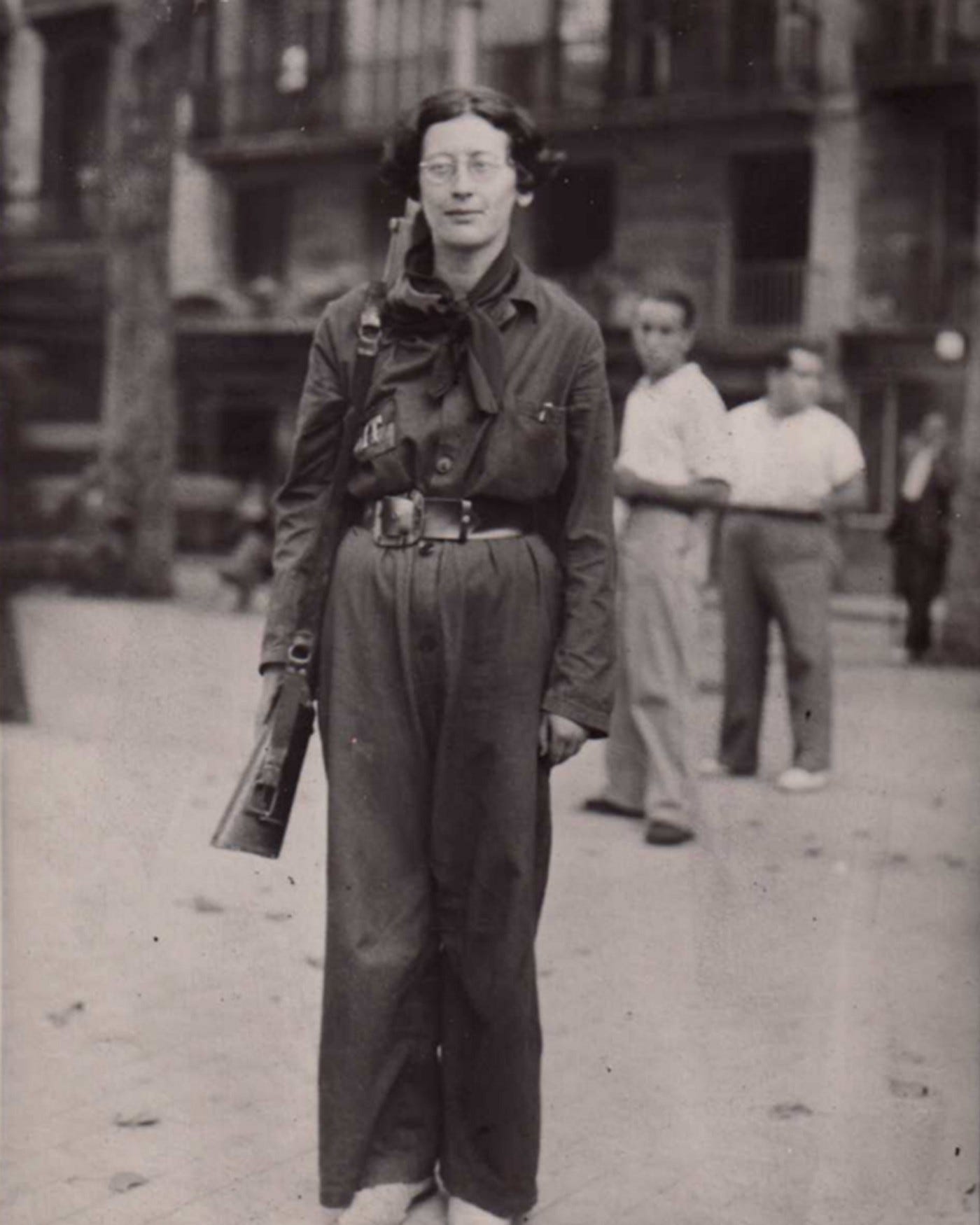The Need for Roots
Simone Weil
Lately I’ve been binge listening to Stephen West’s remarkable podcast “Philosophize This!”
Greg Hochmuth recommended the podcast to me for the first time in 2020, when we were participating in an Article Club together in the darkest days of the pandemic.
Nearly three years later I’m in Costa Rica. Down here the air is hot and humid, and my pace slows in every way. Most enjoyable of all, my mind hums at a lower frequency.
Sometimes, to counter that intellectual flatlining, I’ll flip on Stephen West’s podcast.
Today, I listened to the second of three episodes of Philosophize This! on Simone Weil—“a French philosopher, mystic and political activist” while stretching at sunrise on the beach.
Here are a few highlights from Simone Weil’s biography:
Simone Weil was a university classmate of Simone de Beauvoir at the École Normale Supérieure. (She finished first in her Philosophy class; Simone de Beauvoir finished second.)
After garnering a fancy degree, she diverged from her classmates, many of whom became professional academics. In 1934, she took a 12-month leave of absence from her teaching position to work incognito as a laborer in two factories, one owned by Renault, believing that this experience would allow her to better understand the realities of the working class.
Soon after, she travelled to the Spanish Civil War to join the Republican faction. (She was extremely near-sighted, and thus a very poor shot, so her comrades tried to avoid taking her on missions.)
Simone Weil was diagnosed with tuberculosis at just 34. She refused special treatment because of her politics—instead, she limited her food intake to what she believed residents of German-occupied France ate. She died within a year from cardiac failure.
(Stephen West shares more about her biography in this episode).
The Need for Rooting
The episode I listened to this morning is about Simone Weil’s famous ideas on roots. Her book “The Need for Roots: prelude towards a declaration of duties towards mankind” was first published in French in 1949. Like all of her books, it was published posthumously.
Stephen West makes his incredible transcripts available in full on his website, so I thought I’d share a favorite excerpt with you that I found particularly stimulating.
Not unlike a plant Simone Weil would say, a human being needs roots to be able to survive and to grow. But while a plant needs soil to grow in, people get their roots from their “real, active and natural participation in the life of the community."
In other words people feel rooted when they participate in the culture or the nation that they’re a part of, and more than that there’s a certain part of everyone—certain particular ways you talk or act around other people that can only be expressed and only make sense in the context of the culture or nation that you’re rooted in.
So to continue the metaphor of the plant, let’s say someone comes along and rips a plant out of the ground, or tears up the soil that the plant is growing in, and when they do that it’s not surprising when that plant, dies. Simone Weil would say when we live in a world of rampant colonialization, where we destroy cultures for the sake of our political ends we are essentially ripping people like plants out of the only soil they have that allows them to survive and grow.
What’s she referring to when she says colonialism? Well, remember she’s living in France at the beginning of WW2. At this point the Nazis have already invaded. If the Nazis decide to let you live, French culture from this point forward is effectively subjugated and silenced. If you are a former citizen of France at this point, you’re told you should be thankful to have the privilege of even being a Nazi now. Because don’t worry, the Nazis will tell ya, this is a better culture than yours was. You should be thankful for it.
Simone Weil is going to almost instantly make the point that no French person that hears this thinks what the Nazis are doing here is okay. But where’s their bleeding heart for the hundreds of years of colonizing that France has done up until WW2, during the age of exploration?
She says France also subjugated cultures and told them don’t worry! This is a better way of doing things! We’re going to civilize you! You shouldn’t be complaining! You should be writing us a thank you card right now!
…There are so many obvious examples historically probably in all of our countries that still have echoes to this day. My point is this idea that in order to help people, what we gotta do is invade them and transplant them from one cultural flower bed to another and then on the other side of that tell them well, “this is just a better culture. You should be grateful. Find a way to make it work.”—both human beings and plants don’t work that way to Simone Weil. When you take a plant and you tear it’s roots out of the ground and plant it in an entirely different type of soil with a totally different microbe profile, that plant could die, or even worse sometimes continue on living sad and withered.
Well what happens when you do that with people? Colonialization is the cause of many of the problems that we face in the world right now to Simone Weil. And she’s not just talking about physical colonization where an army takes over a culture by military force. There are ways to uproot people through political force as well.
When you spend time in the factories. When you spend time on the front lines with soldiers. When you spend time with anyone living in this age of industrialization, rationalization, the society of the spectacle comes to mind for anyone where human relationships have been reduced to moving images on a screen, or monetary transactions, or numbers. Wherever you can find afflicted people, you will find people who find it extremely difficult to feel rooted in the culture they geographically live in because it’s extremely difficult to participate in a meaningful way. You don’t have to colonize and uproot people if they never had roots to begin with. The society is systematically designed in a way that makes it difficult for the average person to feel rooted and participating within it.
Now again, if a society was setup in a way where it was really difficult for people to get food, it would almost seem like a human rights violation. Needs of the soul, well, we think differently about those things. But should we be?
You can listen to the full episode here:
While listening on the beach this morning, I couldn’t help but think what these ideas mean for a country like the United States. Whether you moved to San Francisco or New York from Iran or from New Orleans, so many of us are living dislocated from the land and societies that we or our parents grew up in. Of course there’s so much gained from the diversity we get to experience in the US, but what is lost in a country pulsating with uprooted lives?
I’m curious to hear your experience. Talk to me in the comments, if you dare.





One of my favorite thinkers and probably had a greater influence on me than I can convey; I was very lucky to come across her. I think I quote her at least weekly, and her work was a source of immense delight for my father, too; we discussed her often. Lovely post!!!
This write up / recommendation is well-timed for my current chapter in life. Thank you for sending it!